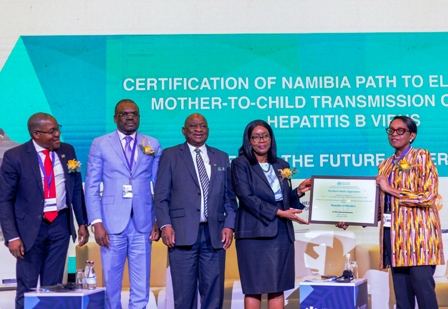Namibia inches towards elimination of mother-to-child HIV transmission, hepatitis B
... becomes first high-burden country in the world to be awarded WHO's “silver tier” and “bronze tier” for progress
Namibia has become the first country in Africa – and the first high-burden country in the world – to reach a significant milestone on the path towards eliminating vertical mother-to-child transmission of both HIV and viral hepatitis B.
Eastern and Southern Africa is home to more than half the world’s HIV burden and Africa accounts for two thirds of new hepatitis B infections globally. Namibia is home to more than 200 000 people living with HIV and new infections disproportionately impact females.
Progress is possible. Globally, 2.5 million children have avoided vertical transmission of HIV since 2010, 28 000 of whom are in Namibia. HIV testing among pregnant women is almost universally available across the country and access to treatment has led to a 70% reduction of vertical transmission in the last 20 years. In 2022, only 4% cent of babies born to mothers living with HIV acquired the virus. Almost 80% of infants received a timely birth dose of hepatitis B vaccine, one of the key metrics of success on the path to elimination.
Namibia has integrated primary health care with antenatal, child health and sexual and reproductive health services. The government committed stable domestic finance to national health programmes, offering widely accessible, quality and free of charge clinical services and support.
Based on specified criteria, the World Health Organization (WHO) has awarded Namibia “silver tier” status for progress on reducing hepatitis B and “bronze tier” for progress on HIV. Namibia’s achievement follows a concerted strategy to curb the transmission of hepatitis B, HIV and syphilis. WHO’s Triple Elimination Initiative aims to safeguard the health of mothers and children and affirm the rights of every child to be born free from the burden of these viruses.
“This is a landmark achievement by Namibia that demonstrates the life-saving possibilities of committed political leadership and effective implementation of public health priorities,” said Dr Matshidiso Moeti, WHO Regional Director for Africa. “With concerted efforts, we can accelerate progress to reach the goals of ending mother-to-child transmission of HIV, hepatitis B and syphilis – the triple elimination.”
The validation process, led by WHO in collaboration with UNICEF, UNAIDS and UNFPA, evaluates data and standardizes milestones for eliminating diseases. Among other factors, WHO certifies a country as having attained silver tier status when the hepatitis B vaccine is given to 50% or more newborn babies. Bronze certification is awarded to countries which have reduced the vertical transmission of HIV from mother to child to less than 5%.
“In many countries we are failing our children by not reaching them with the same treatment with which we reach their mothers and other adults,” said Anne Githuku-Shongwe, UNAIDS Regional Director, East and Southern Africa. “Namibia has fought against this injustice and we are proud to celebrate their immense effort to leave no child behind. They serve as a beacon for the entire region.”
The triple Elimination Initiative promotes an end to vertical transmission of HIV, syphilis and hepatitis B virus, all of which are prevalent in low- and middle-income countries. It encourages countries to integrate services, using a person-centred approach to improve health outcomes for mothers and children.
“Namibia has met this milestone by taking a truly integrated approach to the HIV response from early on,” said Etleva Kadilli, UNICEF Regional Director for Eastern and Southern Africa. “The country has not addressed HIV in isolation as a single disease, but as part of a broader health and development agenda, encompassing maternal and child health for all. Namibia has reached mothers and their children, even in the most rural areas.”
Namibia’s first National Elimination Strategy was initiated in 2014, followed by the National Roadmap to Elimination of HIV and syphilis in 2020, with viral hepatitis B added later. Namibia established a multisectoral National Validation Committee, in line with WHO guidance, for elimination of the three diseases.

